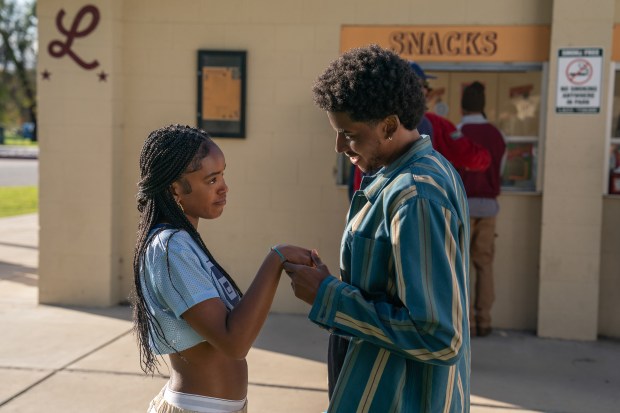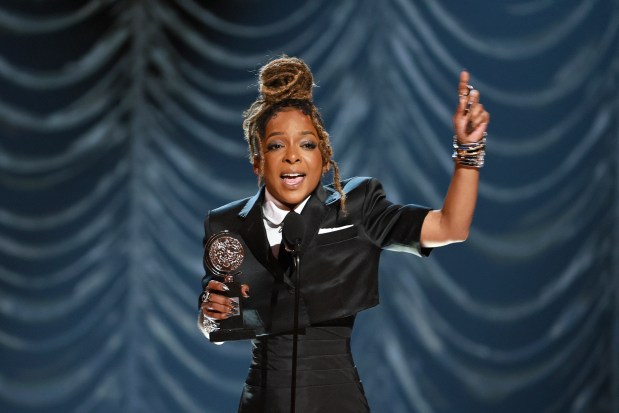Judy Blume’s 1975 novel “Forever …,” about a New Jersey high schooler’s first love — and first experiences with sex — is a book I initially encountered with a childhood friend who got her hands on a copy. We snuck off to read the more explicit portions, giggling about them afterwards; the boy has named his penis Ralph and, come on, you have to laugh! Blume has always been able to capture the inner lives of teenagers as they struggle to figure out how to move through the world in that awkward limbo between child and adult, and it makes sense that Mara Brock Akil (creator of the sitcom “Girlfriends” and the drama “Being Mary Jane”) would want to rethink some of those themes for the 21st century with her TV adaptation for Netflix.
Blume has said she wrote the book at the urging of her daughter, who asked for a story about “two nice kids who have sex” without dire consequences. That’s because, at the time, in novels about teenagers in love, “if they had sex the girl was always punished. … Girls in these books had no sexual feelings and boys had no feelings other than sexual. Neither took responsibility for their actions. I wanted to present another kind of story — one in which two seniors in high school fall in love, decide together to have sex, and act responsibly.”
Akil has similar intentions in mind and the result is a lovely and wonderfully textured TV series about a couple of teens finding a romantic connection with one another. (This is actually the second screen adaptation; in 1978 CBS, turned the novel into a TV movie starring Stephanie Zimbalist.)
Though the book is told from the girl’s point of view, Akil has adjusted “Forever” (and removed the ellipses from the title) so that we see the story through the eyes of both characters, beginning with Justin (Michael Cooper Jr.), who is cute and a little shy and comes from a wealthy family. At a New Year’s Eve party in his junior year, he locks eyes with Keisha (Lovie Simone) who goes to a different school. She’s stunning and quietly confident and comes from far more modest circumstances. At first he doesn’t recognize her, but she reminds him that they knew each other as kids. The spark has been lit.
The setting is now Los Angeles instead of New Jersey. Individually, Justin and Keisha are going through what are fairly normal adolescent experiences, but they’re weighty all the same. The pressure of measuring up to expectations. When kids don’t feel comfortable telling their parents what’s really going on, or have trouble figuring out when to be vulnerable and when to protect themselves. (A text is composed — “I’m sorry I pushed you away, I was hurt” — only to be deleted in favor of “hey.”) You like them as people, and you have compassion for their growing pains. They are fundamentally kind, but bruise one other’s feeling easily. It’s a story of fumblings and misunderstandings at an age when everything seems so raw, so precarious, because you’re still growing up and deciding who, and what, matters.
The show retains a handful of details from the original (fondue is served at the party where they meet; Ralph is indeed referenced briefly) that serve as nods to the source material, but the show itself is a wholly original creation tackling complications that kids face today, specifically through the prism of Black teen life.
Things like social media or the three dots of a text message that never comes. The prevalence of phone cameras that can record even the most intimate of moments, only to see them blasted out to their peers. The latter is something Keisha has to contend with and this contradicts some of Blume’s original goals, because Keisha is adversely affected — punished, if you will — by a sex tape that gets shared at her school. Her classmates judge her but the show doesn’t, at all. In fact, “Forever” is deeply compassionate and understanding when it comes to the anxiety Keisha experiences afterwards, and you could argue Akil is just addressing the realities of teen life today. Sometimes kids have bad judgement and it’s valid to see that through the eyes of the young people at the center of this story.
This life stage can be emotionally messy. That’s a given. But the show spends too much of the narrative contriving reasons Justin and Keisha can’t be together (this comes up often and makes the show feel longer than it should) rather than letting us see the relationship develop more in the early going, when we need to believe they’ve established something deeper than a teenage infatuation.
So much rests on Cooper and Simone’s performances, which are terrific. His eyes light up when he spots her walking towards him to meet for their first date. She’s a wonderful mix of assertiveness and sensitivity. It’s hard enough figuring out who you are, let alone who you are as one half of a couple, and both actors navigate this uncertainty with nuance. (The larger ensemble is just as strong, including Karen Pittman and Wood Harris as Justin’s patents, and Xosha Roquemore as Keisha’s mom.)
Young love can feel so intense and words like “forever” get tossed around because that’s how those feelings seem in the moment. Like the book, the show understands that this is usually just one chapter — albeit an important chapter — among many more to come.
“Forever” — 3.5 stars (out of 4)
Where to watch: Netflix
Nina Metz is a Tribune critic.





